In 1941, Thurgood Marshall traveled to Hugo, Oklahoma to defend W.D. Lyons, a black man accused of killing a couple and their young child, then burning down their house. Black leaders in Oklahoma wrote to Walter White, Executive Secretary of the NAACP, insisting Lyons was innocent. White sent Marshall to Oklahoma to investigate.
Marshall learned that a convict in a state prison had confessed to the crime soon after it occurred. The convict had been temporarily let out from prison when he murdered the family. A prison warden was fired for allowing inmates to go on unsupervised excursions, but - Marshall concluded - in order to avoid a larger political scandal, the governor of Oklahoma dispatched his special investigator to "find the real culprit." Police apprehended Lyons and beat him until he made a confession.
While in Oklahoma, Thurgood Marshall wrote letters to the main NAACP office in New York, describing the trial. He said folks in Hugo had been talking about "a Nigger lawyer from New York" trying the case. Crowds of blacks and whites gathered in the courtroom to see Marshall in action.
The jury found W. D. Lyons guilty, but only imposed a life sentence instead of the death penalty. For an innocent black man, tried in a Southern court for killing whites, life in jail was still a victory. For Marshall, it was also an excellent case to appeal all the way to the U.S. Supreme Court, and one that could raise money for the cash-strapped NAACP Legal Defense Fund.
What follows are three letters Marshall wrote before, during, and after the Lyons case.
|
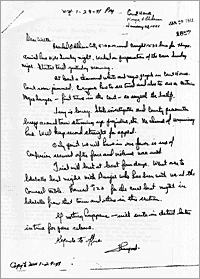 |
Court House
Hugo, Oklahoma
January 28, 1941
Dear Walter:
Reached Oklahoma City 8:10 A.M. and caught 12:30 bus for Hugo. Arrived here 6:30 Sunday night. Worked on preparation of the case Sunday night. Started trial yesterday morning.
At least a thousand white and Negro people in Court House. Court room jammed. Everyone here to see trial and also to see a certain Negro lawyer - first time in this court - so sayeth the bailiff.
Jury is lousy. State investigator and County prosecutor busy around town stirring up prejudice, etc. No chance of winning here. Will keep record straight for appeal.
Only point we will have in our favor is use of confession secured after force and violence was used.
Trial will last at least four days. Went over to Idabell last night with Dunjee who has been with us at the Counsel table. Raised $120 for the case last night in Idabell from that town and others in this section.
If nothing happens - will write in detail later in time for press release.
Regards to office.
Thurgood.
|
|
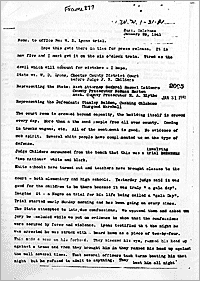
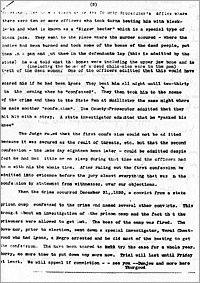
|
Hugo, Oklahoma
January 29, 1941
Memo. to office Re: W. D. lyons trial.
Hope this gets there in time for press release. It Is now five and I must get it on the six o'clock train. Tired as the devil which will account for mistakes - I hope.
State vs. W. D. lyons, Choctaw County District Court
before Judge J. R. Childers
Representing the State: Asst Attorney General Samuel Latimore
County Prosecutor Hotaan Horten
Asst. County Prosecutor E. A. Blythe
Representing the Defendant: Stanley Belden, Cushing Oklahoma
Thurgood Marshall
The court room is crowded beyond capacity, the building itself is crowded every day. More than a thosand people from all over county. Coming in trucks wagons, etc. All of the sentiment is good. No evidence of mob spirit. Several white people have complemented us on the type of defense.
Judge Childers announced from the bench that this was a trial involving "two nations" white and black.
White schools have turned out and teachers have brought classes to the court - both elementary and high schools. Yesterday judge said it was good for the children to be there because it was truly "a gala day". Imagine it - a Negro on trial for his life being called a "gala Day". Trial started early Monday morning and has been going on ever since. The State attempted to introduce confessions. We opposed them and asked that jury be excluded while we put on evidence to show that the confessions were secured by force and violence. Lyons testified that the night he was arrested he was struck with a board known as a piece of two-by-four. This made a scar on his forhead. They blacked his eye, rammed his head up against a tree and when they brought him in they rammed his head up against the wall several times. That several officers took turns beating him that night but he refused to admit to anything. They beat him all night.
Sometime later he was taken up to the County Prosecutor's office where there were ten or more officers who took turns beating him with black jacks and what is know as a "Nigger beater" which is a special type of black jack.They went to the place where the murder occured - where the bodies had been burned and took some of the bones of the dead people, put them in a pan and put them in the defendants lap (this is admitted by the state) he was told what the bones were including the upper jaw bone and (including the bones of a dead child-also were in the pan) teeth of the dead woman. One of the officers admitted that this would have scared him if he had been Lyons. They beat him all night until two-thirty in the morning when he "confessed". They then took him to the scene of the crime and then to the State Pen at McAllister the same night where he made another "confession". The County Prosecutor admitted that they hit him with a strap. A state investigator admitted that he "yanked his knee"
The Judge ruled that the first confession could not be admitted because it was secured as the reult of threats, etc. but that the second confession - the same day eighteen hours later - could be admitted despite fact he had had little or no sleep during that time and the officers had been with him the whole time. After ruling out the first confession he admitted into evidence before the jury almost everything that was in the confession by statements from witnesses, over our objections.
When the crime occurred December 31, 1939, a convict from a state prison camp confessed to the crime and named several other convicts. This brought about an investigation of the prison camp and the fact that the prisoners were allowed to get out. The boss of the camp was fired. The Governor, prior to election, sent down a special investigator, Verni Cheatwood who had Lyons, a Negro arrested and he did most of the beating to get the confession. They have been scared to try the case for a whole year. Sorry, no more time to put down any more now. Trial will last until Friday at least. We will appeal if conviction - - see you --Dunjee and more here
Thurgood
|
|
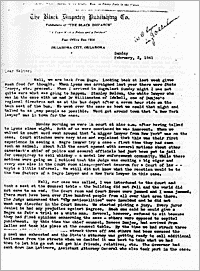
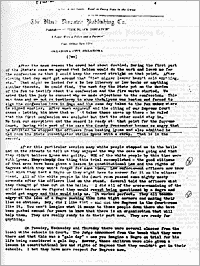
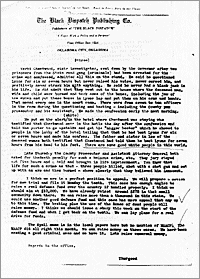
|
Sunday
February, 2, 1941
Dear Walter
Well, we are back from Hugo. Looking back at last week gives much food for thought. When Lyons was arraigned laat year there were State Troops, etc. present. When I arrived in Hugo last Sunday night I was not quite sure what was going to happen. Stanley Belden, the white lawyer who was in the case with us and Dr. Williamston of Idabell, one of Dunjee's regional directors met me at the bus depot after a seven hour ride on the back seat of the bus. We went over the case as best we could that night and talknd to as many people as possible. Word got around town that "a New York lawyer" was in town for the case.
Monday morning we were in the court at nine a.m. after having talked to Lyons since eight. Both of us were convinced he was innocent. When we walked in court word went around that "a nigger lawyer from New York" was on the case. court attaches were very nice and explained that this was their first such an animal. About 9:15 the court opened with several motions about other cases. The chief of police and several officials had just been put in jail for conspiracy to sell whisky - a model law enforcement community. While these motions were going on I noticed that the Judge was smokin a big cigar and maybe a little informal. We still did not know what the reaction would be to the two factors of a Negro lawyer and a New York lawyer in this case.
Well, our case was called, I was introduced to the Court and took a seat at the counsel table - the building did not fall and the world did not come to an end. The court room and Court House were jammed and I mean jammed. The Judge announced that "two nationalities" were involved and he did not want any disorder in the Court House. We started picking a jury. Every juror denied he had any prejudice against Negros. Each one said he could give a Negro as fair a trial as a white man. Several, however, refused to sit because they had fixed opinions concerning the case - others were opposed to capitol punishment. By this time the chief counsel, Roscoe Dunjee, had arrived from Dallas and took his place at the counsel table. By the time we had struck three jurors off and others had been excused the panel was exhausted and the State's attorney was getting ready to call additional tailesman from the streets when we decided it was best to take what we had then to let him go out and get his friends, relatives, etc. The Governor had sent down Sam Latimore, Assistant Attorney General who also took part in the case.
After the noon recess the crowd had about doubled. During the first part of the State's case we agreed that Belden would do the work and leave me for the confession so that I could keep the record straight on that point. After closing that day word got around that "that nigger lawyer hasn't said anything, etc." That night we looked for a law library or law books of anything similar thereto. No could find. The next day the State put on the Warden of the Pen to testify about the confession and the fire works started. We asked the jury be excused while we made objections to the confession. This was done and we put on testimony to show that Lyons was beaten and forced to sign the confession here in Hugo the same day taken to the Pen where he signed another. After much argument and the citing of our Supreme Court cases - letting hime know that we had taken these cases up there - he ruled that the first confession was excluded but that the other could stay in. We took exceptions and the record is ready at that point for the Supreme Court. During this part of the case the County Prosecutor became so angry that he admitted he stopped the officers from beating Lyons and also admitted he had seen the State Investigator strike Lyons with a strap. That is in the record.
After this particular session many white people stopped us in the halls and on the streets to tell us they enjoyed the way the case was going and that they didn't believe Lyons was guilty. 90% of the white people by this time were with Lyons. One thing this trial accomplished - the good citizens of that area have been given a lesson in Constitutional Law and the rights of Negros which they won't forget for some time. Law enforcement officers now know that when they beat a Negro up they might have to answer for in on the witness stand. All of the white people in the Court room passed some mightly nasty comments after the officers lied on the stand. Several told the officers what they thought of them out on the halls. I did all of the cross-examining of the officers because we figures they would resent being questioned by a Negro and would get angry and this would help us out. It worked perfect. They all becamse angry at the idea of a Negro pushing them into tight corners and making their lies so obvious. Boy, did I like that - and did the Negros in the Court-room like it. You can't imagine what it means to these people down there who have been pushed around for years to know that there is an organisation that will help them. They are really ready to do their part now. They are ready for anything.
On Tuesday, Wednesday and Thursday there were several classes from the local white schools on Court. The Judge announced from the bench that they were there and that this was a "gala day" - can you imagine a Negro on trial for his life being considered a gala day? However, these children were also given a lesson in constitutional law and rights of Negros that they wouldn't get in their schools. I bet they have more respect for Negros now.
Verni Cheatwood, state investigator, sent down by the Governor after two prisoners from the State road gang (criminals) had been arrested for the crime and confessed, admitted all this on the stand. He said he questioned Lyons for six or seven hours by never raised his voice, nevered cursed him, and positivly never struck him with anything. He said he never had a black jack in his life. He did admit that they went out to the house where the deceased man, wife and child were burned and took some of the bones, including the jaw of the woman and put these bones in Lyons lap and put them on his arms and hands. That moved every one in the court room. There were from seven to ten officers in the room during the questioning and beating - including the county prosecutor and his assistant. He made the confession early in the morning.
We put on the clerk (white) in the hotel where Cheatwood was staying who testified the Cheatwood came in the hotel the day after the confession and told the ported to go upstairs and get his "nigger beater" which he showed to people in the lobby of the hotel telling that that he had beat Lyons for six or seven hours and made him confess. The father and sister in law of the deceased woman both testified that Cheatwood had told them he beat Lyons for seven hours from his head to his feet. There are some good white people in the world.
Late Thursday the County Prosecutor and Assistant Attorney General both asked for the death penalty for such a heinous crime, etc. The jury stayed out five hours and a half and brought in life imprisonment. You know that life for such a crime as that - three people killed, shot with a shot gun and cut up with an axe and then burned - shows clearly that they believed him innocent.
I think we are in a perfect position to appeal. We will prepare a motion for a new trial and file in Monday with the tenth. This case has enough angles to raise a real defense fund over the country if handled properly. Think we should aim at $10,000. We have already raised around $275 in that small community down there. We can raise more than a thousand in this state. We could use another good defense fund and this case has more appeal than any up to this time. The beating plus the use of the bones of dead people will raise money. I think we should issue a story this week on the start of the defense fund and when I get back on the tenth. We can lay plans for a real drive for funds.
The Spell is in the local papers here but no mention of NAACP. The NAACP did all right this month. We can raise money on these cases. We have been needing a good criminal case and we have it. Lets raise some real money.
Regards to the office.
Thurgood.
|
|
|